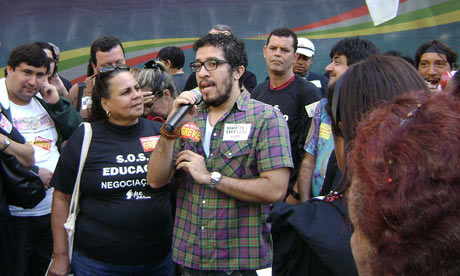Jean Wyllys, Brazil's first openly gay MP, takes fight to the religious right
Stance against homophobia has made former Big Brother contestant a hate figure for religious zealots, but he has vowed to keep battling

Jean Wyllys, Brazil's first openly gay MP, speaks at a protest.
In the sitting room of his eighth-floor Copacabana apartment, Jean Wyllys has hung a multicoloured portrait of one of his closest allies: the dragon-slaying Saint George. In Wyllys' native Brazil, George represents Ogun, the Yoruba god of war, politics and fire.
And Wyllys – Brazil's first openly gay MP and a man locked in conflict with the country's powerful religious right – needs all the support he can get.
"It is a difficult battle to fight. Sometimes I feel like Don Quixote, you know?" said the 37-year-old former Big Brother contestant who has been called South America's answer to Harvey Milk, the San Francisco politician and gay rights activist assassinated in 1978.
"But this is my vocation. My calling. I feel that I need to be here."
"Here" is on the frontline of an increasingly venomous feud with a legion of outspoken and unashamedly radical evangelical preachers.
It is a confrontation that some have compared to the culture wars in the US, and one in which Brazil's reputation as an open and tolerant rainbow nation is undermined by firebrand pastors who conduct exorcisms of lesbians and gay men and pronounce that African-Brazilian religions are the work of "Satanás".
"These churches are advancing on hearts and minds," said Wyllys, accusing neo-pentecostal preachers of "demonising" gay people and the followers of African-Brazilian religions such as Umbanda in order to bolster their flocks. "For a long time they advanced silently – and now we are starting to realise the political force they have become," he said.
Jean Wyllys de Matos Santos was born in Alagoinhas, a small town in the north-eastern state of Bahia, in 1974. His mother was a washerwoman who worked at the local Pojuca river and his father was an alcoholic. One of seven children, he lost a sister to typhoid. Aged 10 he sold candyfloss to help his family make ends meet. In his teens, Wyllys sought refuge in the left-leaning Catholic church, where priests encouraged him to read "everything, from the Bible to Mario Vargas Llosa". "What my parents couldn't give me the church did," he said.
From Alagoinhas he moved to the state capital, Salvador – home to Brazil's first organised gay rights movement. He got a degree and built a career as a journalist. Then he relocated to Rio de Janeiro, applied to appear in Brazil's version of the reality show Big Brother, and won – with 50m votes. "This had great political relevance," he said. "I said I was homosexual and I still won the programme in a country that is homophobic."
Those expecting Wyllys to disappear after his 15 minutes of fame were mistaken. In 2010 he was elected federal MP for the Socialism and Liberty party and since then his battle for human rights has earned him widespread accolades.
This week, IstoE, a Brazilian news magazines, named him one of the 100 people to watch in 2012, alongside figures such as Kim Jong-un, Barcelona FC coach Pep Guardiola, Brazil's president, Dilma Rousseff, and Barack Obama.
"In 2012 he will have more influence than anyone else in the fight to criminalise homophobia," its editorial said.
But Wyllys has become a hate figure for more extreme elements of the religious right, who have posted numerous derogatory videos online. One accuses Wyllys of waging a "personal war" against religion and a "campaign against Christianity".
Wyllys has also come under attack from preachers such as Silas Malafaia, a notorious televangelist who has fought recent attempts to criminalise homophobia and describes himself as "public enemy No 1 of the gay movement".
"They want to silence and criminalise opinion," Malafaia claimed in one recent rebuke to Wyllys.
"Silas Malafaia's hands and the hands of these other pastors are covered in blood: the blood of homosexuals who die in Brazil victims of homophobia," said Wyllys, who wants the Brazilian constitution changed to allow civil marriages between same-sex couples and hopes his presences in congress will open the door to more gay politicians.
"In the whole world it is bad but here it is frightening that there are not more [openly gay politicians]," he said. "But I think … my political actions – and the positive way that most people are receiving my term – might change this. Maybe people will lose fear of voting for a homosexual."
Publicação de The Guardian UK. Acesso em 28 de Janeiro de 2012. 14:52














Excellent!
ResponderExcluir